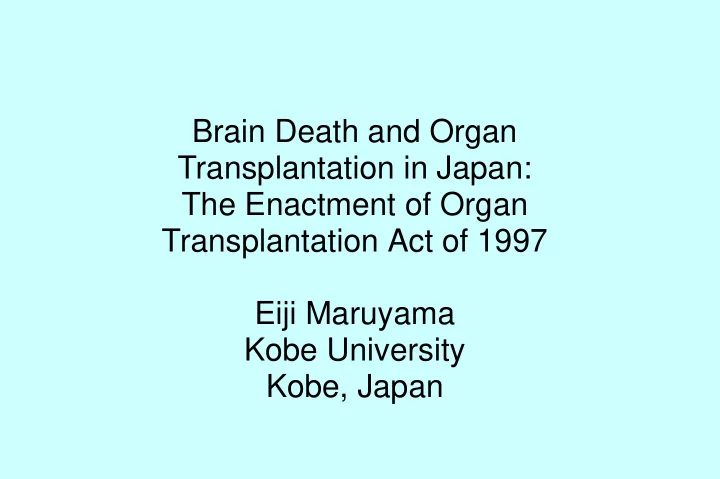

Brain Death and Organ Transplantation in Japan: The Enactment of Organ Transplantation Act of 1997 Eiji Maruyama Kobe University Kobe, Japan
History of Japanese Laws Concerning Transplantation 1997.06: An Act Concerning Organ Transplantation [hereinafter called the new Act] 1979.12: An Act Concerning the Transplantation of Cornea and Kidneys [hereinafter called the old Act] 1958.04: An Act Concerning the Corneal Transplantation
Main Points of the old Act 1. It applied only to the transplantation of kidneys and cornea removed from dead bodies. 2. It was implied that the donor’s death was to be declared by conventional criteria. 3. Requirements for organ removal: (a) The deceased, while alive, has given his written consent to the removal and the surviving relatives do not object to the removal, or (b) The surviving relatives give written consent to the removal.
Main Points of the new Act 1. It applies to the transplantation of a variety of organs including heart, lung, liver, kidney, pancreas, small intestine, and cornea. 2. It for the first time officially authorizes the removal of organs from brain dead bodies to be used for transplantation. 3. The definition of the dead body includes the “body of a brain-dead person.” The body of a brain-dead person is defined as the body of a donor who has sustained irreversible cessation of the functions of the entire brain.
4. Requirement of organ removal: For the removal from brain dead donors, both (a) and (b) must be met. In the case of donors whose death is determined by conventional criteria, only (a) must be satisfied. (a) The deceased, while alive, has given his written consent to the removal and the surviving relatives do not object to the removal. (b) The deceased, while alive, has expressed his written acceptance of the determination of death by brain criteria and the surviving relatives do not object to it.
Transition Provision with respect to Kidney and Corneal Transplantation: Background 1. The new Act denies a surviving family’s power to authorize organ removal in the absence of the donation by the deceased. 2. The old Act allowed organ removal based upon the consent of a donor’s family. Actually, most of the cadaveric kidneys and cornea were retrieved based upon the family’s consent.
Main Points of Transition Provision 1. Kidneys or eyeballs can be removed based upon the consent of the surviving relatives. 2. If the deceased has, while alive, objected to being used as a donor, the surviving relatives cannot consent to the removal. 3. It applies only to the removals of kidneys and eyeballs. 4. It applies only to the cases where the donor’s death is determined by the conventional criteria.
Theoretical Problems of the new Act 1. Brain criteria can be applied only where the donor, while alive, has expressed his approval of the death determination by brain criteria and his family do not object to it. Is there any justification for limiting the application of brain criteria to the transplant donor who has expressed his approval of it?
2. In the case of kidney and corneal transplant, removal from the donor who died a conventional death can be effected based upon his family’s consent, whereas removal from the brain dead donor cannot without the consent of the donor himself. Does this difference in removal requirement suggest that the death declared by brain criteria is not equal in legal effect to the death declared by the conventional criteria, and brain dead body is not dead in a full sense of the word?
Practical Problems 1. Under the new Act, a donor’s written acceptance of brain criteria is essential to the removal of organs from the brain dead body. As this requirement was not known under the old Act, only the donor card forms made after the promulgation of the new Act can satisfy it. Although the Ministry of Health and Welfare and Japan Organ Transplant Network have been making vigorous efforts to achieve a wide distribution of the cards, until now, only a few percent of the population have executed them.
2. Administrative guidelines promulgated by the Ministry of Health and Welfare limited the hospitals where the organ retrievals can be made from brain dead donors to 96 institutions consisting of university hospitals and educational hospitals of emergency medicine (In June 1998, the Ministry increased the number of hospitals, now totaling 338).
3. More than 9 months have passed since the new Act came into force on October 16, 1997. However, there have been no cases of transplant using a brain dead donor. Doubtless, the main reason for the absence of the case is the strict requirements for organ removal. We are currently groping for a solution. My proposal would be to eliminate the writing requirement for a donor’s approval of brain criteria and donation of his organs. However, I cannot become too optimistic about not only my proposal but any other ones to amend the removal requirements in our law.
Recommend
More recommend